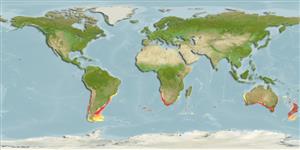>
Scombriformes (Mackerels) >
Gempylidae (Snake mackerels)
Etymology: Thyrsites: Greek, thyrsites, -ou = stalk of a plant, an ornament like a pine cone borne by Bacchus (Ref. 45335).
Environment: milieu / climate zone / depth range / distribution range
Ecologie
marien; brak water benthopelagisch; oceanodroom; diepte 0 - 550 m (Ref. 6390), usually 100 - 500 m (Ref. 6181). Subtropical; 13°C - 18°C (Ref. 6181); 21°S - 56°S, 75°W - 177°E (Ref. 54924)
Southwest Atlantic: Uruguay, Argentina and Tierra del Fuego. Eastern Atlantic: Tristan da Cunha and South Africa. Western Indian Ocean: South Africa and the St. Paul and Amsterdam islands. Eastern Indian Ocean: Tasmania and southern coast of Australia. Southwest Pacific: New Zealand and southern coast of Australia. Southeast Pacific: southern Peru, Chile, and Tierra del Fuego.
Lengte bij maturiteit / Grootte / Gewicht / Leeftijd
Maturity: Lm 55.0, range 50 - 60 cm
Max length : 200 cm SL mannelijk / geslacht onbekend; (Ref. 3630); common length : 75.0 cm SL mannelijk / geslacht onbekend; (Ref. 6181); max. gepubliceerd gewicht: 6.0 kg (Ref. 6181); max. gerapporteerde leeftijd: 10 Jaren (Ref. 28892)
Korte beschrijving
Determinatiesleutels | Morfologie | Morfometrie
Dorsale stekels (totaal) : 19 - 21; Dorsale zachte stralen (totaal) : 11 - 13; Anale stekels: 1; Anale zachte stralen: 10 - 12; Wervels: 35. Body elongate and strongly compressed. Lateral line single, running close to the upper contour of the body below most of the first dorsal-fin base then abruptly curving ventrally. Body is dark blue, slightly paler on belly; first dorsal fin membrane black (Ref. 6181).
Inhabit continental shelves or around islands. Feed on pelagic crustaceans (Euphausia, Nyctiphanes), cephalopods and fishes (Ref. 6181) like anchovy and pilchard (Ref. 36731). Form schools near the bottom or midwater; sometimes even at the surface at night (Ref. 6181). Prefers temperature between 13° and 18°C (Ref. 36731). Marketed fresh, smoked, canned and frozen; eaten fried, broiled, microwaved and baked (Ref. 9988). Good for fish and chips or smoking; also made into fillet or fish cake in Japan (Ref. 6181). Commonly called as Baracoutta and because it is a fast predator, several English vessels were named after it. In the UK during WW II, this canned fish was commonly eaten that many older people have an aversion to it (D. Parkyn, pers. comm. 05/2022).
Spawning patterns are complex, with different stock spawning at different times of the year (Ref. 6390).
Nakamura, I. and N.V. Parin, 1993. FAO Species Catalogue. Vol. 15. Snake mackerels and cutlassfishes of the world (families Gempylidae and Trichiuridae). An annotated and illustrated catalogue of the snake mackerels, snoeks, escolars, gemfishes, sackfishes, domine, oilfish, cutlassfishes,. scabbardfishes, hairtails, and frostfishes known to date. FAO Fish. Synop. 125(15):136 p. (Ref. 6181)
Status op de Rode Lijst van het IUCN (Ref. 130435)
Gevaar voor de mens
Harmless
Gebruik door de mens
Visserij: van groot commercieel belang; sportvis: ja
Tools
Speciale rapporten
Download XML
Internetbronnen
Estimates based on models
Preferred temperature (Ref.
123201): 6.2 - 16, mean 11.2 °C (based on 285 cells).
Fylogenetische diversiteitsindex (Ref.
82804): PD
50 = 1.0000 [Uniqueness, from 0.5 = low to 2.0 = high].
Bayesian length-weight: a=0.00437 (0.00242 - 0.00788), b=3.07 (2.90 - 3.24), in cm total length, based on LWR estimates for this species & (Sub)family-body (Ref.
93245).
Trofisch niveau (Ref.
69278): 3.6 ±0.3 se; based on diet studies.
Generation time: 3.7 ( na - na) years. Estimated as median ln(3)/K based on 1
growth studies.
Weerstandsvermogen (Ref.
120179): Gemiddeld, minimale populatieverdubbelingstijd 1,4-4,4 jaar (tm=2-4; tmax=10).
Prior r = 0.37, 95% CL = 0.25 - 0.56, Based on 1 full stock assessment.
Fishing Vulnerability (Ref.
59153): Moderate to high vulnerability (53 of 100).
Climate Vulnerability (Ref.
125649): Moderate vulnerability (43 of 100).
Nutrients (Ref.
124155): Calcium = 27.5 [13.2, 49.7] mg/100g; Iron = 0.697 [0.342, 1.400] mg/100g; Protein = 17.9 [15.7, 19.9] %; Omega3 = 0.225 [0.130, 0.402] g/100g; Selenium = 67.6 [33.5, 135.3] μg/100g; VitaminA = 8.26 [2.93, 23.72] μg/100g; Zinc = 0.541 [0.382, 0.784] mg/100g (wet weight);
